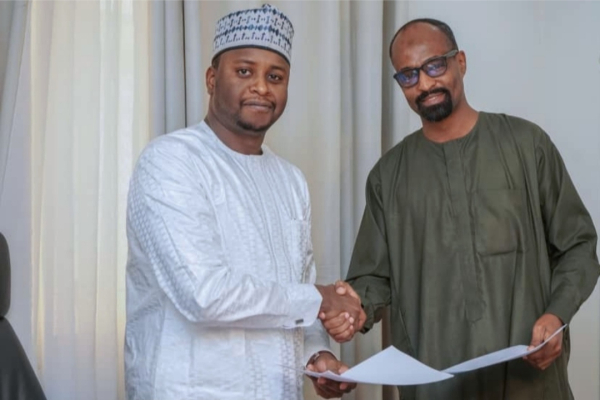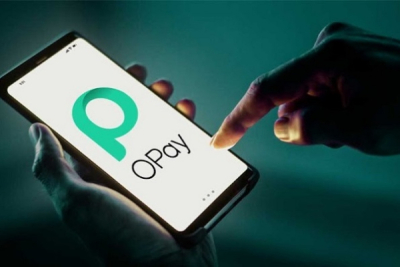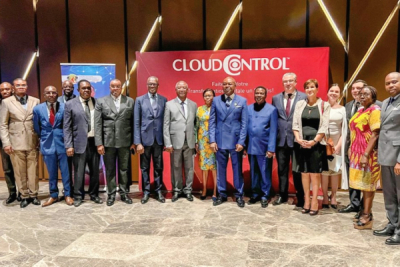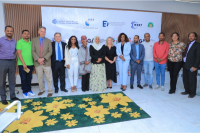
News (1790)
Across Africa, concerns over slowing economic growth and over-reliance on commodities are driving a renewed focus on diversification. Governments are recognizing the urgency of implementing supportive policies, training programs, and financing initiatives to catalyze innovation and unlock new avenues for growth.
Chad Innovation Hub (CIH), a youth entrepreneurship incubator, and the National Agency for Investments and Exports (ANIE) have formalized a partnership aimed at fostering innovation, entrepreneurship, and sustainable development in Chad.
The strategic alliance, announced on Tuesday, January 23, seeks to enhance Chad's entrepreneurial ecosystem by promoting open innovation and stimulating projects in digital technology, the circular economy, corporate social responsibility, and green business models. The partnership will also focus on empowering women and young people, particularly in rural areas, ANIE said in a statement.
The memorandum of understanding between ANIE and CIH includes provisions for the effective implementation of the Sustainable Development Goals (SDGs) and the establishment of a close collaborative relationship to mutually promote the private sector and diversify the economy.
The collaboration aligns with the government's policy to support entrepreneurship in Chad, which recently led to the creation of an FCFA30 billion ($49.6 million) fund. The fund is designed to provide credit guarantees for entrepreneurs and finance key projects in sectors such as agriculture, livestock, and new technologies.
The agreement signals the start of a promising alliance that positions Chad on the international innovation stage. CIH, an award-winning organization, strengthens the belief that innovation and entrepreneurship are key drivers for a prosperous and sustainable future for Chad.
Samira Njoya
Faced with cumbersome identification procedures and fragmented data, Madagascar is embarking on digital identification. The initiative is aimed at streamlining services, bolstering transparency, and optimizing data management.
Madagascar's Ministry of Digital Development, Digital Transformation, Posts and Telecommunications (MNDPT) announced on Friday, January 19, the imminent launch of a digital national identity card project for citizens aged 15 and above. Minister Tahina Razafindramalo (photo, left) told journalists at a press conference that production is set to begin as early as June in several regions.
"This marks a significant step for Madagascar as it embarks on modernizing its identity management system, similar to recent efforts in countries like Tunisia and Greece," remarked Razafindramalo.
The project, financed to the tune of $140 million by the World Bank, encompasses biometric enrolment, data collection, digital infrastructure development, and card production. It aligns with the Malagasy government's Digital Strategic Plan 2023-2028, seeking to streamline administration and centralize data for efficient population registration and census.
UNICEF estimates that roughly 2.5 million children under 18 and 1 million adults currently lack official identification in Madagascar, often due to bureaucratic hurdles or administrative deficiencies. These challenges leave them "administratively invisible," hindering access to essential services and rights.
The implementation of the digital national identity card project is set to revolutionize the way citizens interact with the government and access essential services. The project will provide each target citizen with a unique identifier and biometric ID card, preventing duplicate identity.
Samira Njoya
Orange Botswana's CEO reveals the major achievements of the telecoms company, which is celebrating 25 years of presence on the local market. It also talks about its next major ambitions in a context of digital economy.
We Are Tech : You have been running Orange Botswana for more than two years. How do you view the local telecoms market in terms of digital appetite ?
Néné Maïga : The local telecommunications industry in Botswana is an ever-evolving market-it certainly keeps you on your feet as a leader! A great reason for this is its growth has been prioritized by the Government and all its key players including Orange Botswana. We have worked very well with our Ministry of Communications, Knowledge, and Technology, to ensure that our sector is sustainable.
WAT: How Orange has positioned itself in this context ?
NM: Orange Botswana prides itself in being the “first-to-market leader” in our industry. It was just 5 years ago, in 2018, that we introduced 4G technology, following a similar pattern with the introductions of 3G and 2G. In 2022, we introduced 5G technology, positioning Botswana as a prominent player in the mobile communications sector. This ushered in 5G-enabled partnerships that brought forth innovations in e-health, connected vehicles and cities, real-time gaming, and smart homes. Notably, the collaboration with MRI Botswana, a medical service provider, resulted in the creation of a connected ambulance, enabling doctors to guide paramedics through life-saving procedures in route to hospitals — a feat attributed to the capabilities of 5G technology.
New innovations in digital education, e-health, m-agriculture will consolidate the positioning of Orange Botswana as a multi-service operator. And this positioning will bring a lot of opportunities for local start-ups because our plan is to create an ecosystem which enables them to develop solutions addressing Botswana’s needs.
WAT: Beyond broadband connectivity, what are the other areas where Orange has had a strong impact in Botswana. How does this materialize concretely?
NM: For us, our work with start-ups as well as our digital school programs demonstrates how our strategic partnerships can accelerate the realization of efficiency in implementing the economic diversification drive and closing the gender and digital gap.
Our annual Orange Social Venture Prize Competition provides us with a platform to partner with start-ups that aim to bring innovative solutions that leverage on information and communications technologies (ICT) and future growth sectors in the country. Over the past years, we have supported and partnered with innovators that won the competition such as creators of the Mohiri Job Alert, Brastone of Mpotsa & mAgric and Connexus of Atlega Mobile Education. Recently, the 2023 winners of the initiative, Aga Sure Mobile App took home prize money to jumpstart a micro-insurance platform that will provide access to financial services for unserved and underserved economic communities.
Through our CSR arm, Orange Foundation, we have to date launched the Orange Digital Schools Program across 76 primary schools and upskilled hundreds of women with digital entrepreneurial skills across 8 Women’s Digital Centers. I’d also highlight, our state of the art, digital technology hub, the Orange Digital Center (ODC) launched in November 2022 in Gaborone. The ODC plays a pivotal role in delivering vital ICT training, upskilling, and supporting the creation of innovative digital solutions to enhance employability amongst the youth. In July of this year, 150 students graduated in scratch coding, digital embroidery, and 3D printing from this center.
WAT: Orange Botswana is celebrating its 25th anniversary. What does this milestone mean for the company ?
NM: Twenty-five years ago, Orange Botswana embarked on a mission to connect people, to bridge distances, and to transform lives through the power of communication. It is a powerful thing to realize that our clients and customers trust us with something as sacred as their ability to communicate with those that matter most to them. Whether it is personal or business, voice, or data, they trust us to make this most basic need to feel closer to their family, friends and business partners a daily reality. I am proud to say that Orange Botswana has been a key player in the last 25 years bringing people closer to cutting-edge innovations and digital inclusion. We owe our success to our amazing customers-their unwavering loyalty will certainly propel us into the next 25 years.
WAT: How is Orange planning for Botswana in the coming years ?
NM: Looking ahead, the future is bright for Orange Botswana. There is much to be done further and our passion, purpose and ambition will guide us. We stand at the cusp of a new era, where technology continues to reshape the way, we live and work. As a company, we are committed to staying at the forefront of these advancements, ensuring that we not only meet but exceed the expectations of our customers and clients. We look forward to digitizing the customer experience through platforms such as the Max it App, contributing to the growth of the country’s ICT infrastructure through our Tier III certified Data Center, and witness Orange Money make strides in the mobile money sector.
WAT: You recently won the «Female Innovator of the Year» prize at the Africa Tech Festival at November 2023 in Cape Town, why is this prize special for you ?
NM: I am deeply honored to have been recognized as the 2023 Female Innovator of the Year at the Africa Tech Festival. I believe this reward is a recognition of my contribution to the telecommunications, technology and media sectors in various countries including Cameroon, Mali, Morocco and, of course, Botswana. This is also a testament to the incredible work being done at Orange Botswana, and I share this award with our dedicated team who continue to drive innovation and excellence in our country and industry.
WAT: What meaning do you think this award has for women who demonstrate extraordinary leadership in the ICT sector ?
NM: This award has great meaning for African women in the continent’s tech industry because it validates our contribution to an industry, we have deep respect and passion for. As ICT leaders on the continent, we also understand the difference access to the innovations and technologies we offer has for Africans. I like to cite mobile and internet penetration as well as the rise of mobile money as prime examples of how valuable these ICT solutions can be to our customers’ everyday lives. In Botswana, a street vendor or small business owner now has a safe, convenient, and easily accessible tool to receive, send and save their money with Orange Money-which was not available to them 20 years ago.
So, as African leaders our success has even more meaning when it allows us to give back to our communities, country, and continent in some way.
The prominent Nigerian fintech company is expanding its payment gateway by aligning with leading payment solutions providers, including a recent collaboration with an African unicorn at the start of 2024. This partnership represents a significant step towards increasing the reach and functionality of its platform.
Nigerian fintech leader Interswitch Group announced on Sunday the integration of OPay Wallet into its Interswitch Payment Gateway (IPG), expanding payment options for users and merchants. This move further strengthens Interswitch's position as a digital payments pioneer in Africa.
The integration allows IPG users to pay directly through their OPay Wallets alongside existing options like bank cards, Quickteller, QR codes, and USSD. "Through our latest collaboration with OPay, we are excited to introduce a new dimension of payment convenience to users and merchants. This partnership reflects our dedication to introducing innovations that enhance the digital payment experience, and we are eager to witness the positive impact it will have on the entire payment ecosystem," said Muyiwa Asagba, Interswitch Managing Director of Digital Commerce & Merchant Acquiring (Paymate).
Having achieved unicorn status in 2019 after a 20% stake acquisition by Visa, Interswitch has established itself as a leading African fintech. Last September, it partnered with Google to integrate Google Pay into IPG, further diversifying its offering. This focus on user convenience aligns with the company's mission to simplify everyday life.
OPay, meanwhile, reached unicorn status in 2021 following a $400 million funding round. The fintech has since become a major player in African mobile payments. This partnership exemplifies the rapid growth of the continent's fintech sector, the most attractive for investors. Notably, among Africa's unicorns, only Jumia operates in e-commerce, highlighting the dominance of fintech in the region.
Adoni Conrad Quenum
Since 2020, African technology entrepreneurs have been struggling to access funds. The growth recorded since 2018 has been slowing down and investors are becoming more cautious.
African technology startups secured $1.8 billion in funding in 2023, a 40% decline from $3 billion in 2022, according to data from CB Insights' "State of Venture" report published January 4. The total represents 486 deals, down nearly 49% from 709 in 2022.
Africa's 2023 funding figure falls nearly as low as 2020's $1 billion (493 deals), a year heavily impacted by the COVID-19 pandemic. This decline reflects the relative underperformance of major tech ecosystems like Nigeria, Kenya, and Egypt, which typically attract the most investment and drive overall figures.
Nigeria, for instance, saw a sharp drop, with startups raising $224 million in 2023 compared to $531 million in 2022 and over $1 billion in 2021. This trend aligns with a global slowdown in startup funding, driven by rising interest rates at central banks worldwide.
"In the past 18 to 24 months, particularly due to rising interest rates in the United States and Europe, capital for African startups has significantly diminished. This has led to a scarcity of funds for these startups, many of which relied on this capital for growth and ongoing development. As a result, these startups have found themselves in precarious positions, necessitating cost structure reductions and subsequent staff layoffs," said Tamim El Zein, founder of Seedstars Africa Ventures, in an interview with RFI in November 2023.
Africa's 40% decline is lower than those seen in other regions with the global trend remaining concerning. Latin America saw a 56% drop to $3.3 billion, Europe a 45.25% decline to $48.4 billion, and Asia a 49.48% fall to $53.4 billion.
Adoni Conrad Quenum
Across Africa, a digital revolution is sweeping through, reshaping the aspirations and opportunities for a generation. Driving this transformation is the critical need for young people to be equipped with the skills and knowledge to thrive in the digital age.
The Congolese government officially initiated the construction of “Caria Tech Village,” a technology park, on Wednesday, January 17, in Kintélé. The park is envisioned as a hub for learning and development activities for young incubators and startups in Congo.
Léon Juste Ibombo, Minister of Posts, Telecommunications, and the Digital Economy, emphasized the project’s strategic significance in a world where the digital economy is central. He stated that Caria Tech Village would house the entire digital ecosystem and be built on the site of the former Union Africaine des Postes et Télécommunication.
The park, to be constructed over 2024 by Phone Control, a Tunisian company specializing in digital infrastructure, will be supervised by the Ministry of Digital Affairs and the Ministry of Scientific Research.
Upon completion, Caria Tech Village will provide high-quality training courses for young people, ranging from bachelor’s degrees to doctorates. It will also serve as a space for industry professionals to enhance their skills in innovative technologies. Beyond its training programs, the park will act as a dynamic platform for start-ups, aiding them in fully developing their projects and creating added value.
The project aligns with a government program dedicated to learning and practicing development activities for young incubators. This initiative aligns with President Denis Sassou N’Guesso’s vision: he declared 2024 as the year of youth in Congo.
Samira Njoya
Through this equity investment, the AfDB is indirectly supporting startups that are among the least financed in Africa. This initiative comes against a backdrop marked by a 36% drop, to $3.2 billion, in fundraising by African startups in 2023.
The African Development Bank (AfDB) is boosting early-stage innovation and job creation across Africa with a $10.5 million equity investment in Seedstars Africa Ventures, the development bank announced Wednesday.
The move aims to empower Seedstars, a venture capital fund focused on high-growth African startups, to expand its reach and attract further investors. This will strengthen the continent's entrepreneurial ecosystem, supporting crucial sectors like financial inclusion, healthcare, and off-grid energy.
The AfDB's contribution comprises $7 million from its own resources and $3.5 million from the European Union's Boost Africa program. This injection will enable Seedstars to invest up to $75 million in seed and early-stage startups, providing initial investments of around €250,000 with potential follow-on funding of up to €5 million.
This partnership is expected to unlock vital capital for promising African businesses, creating over 9,000 full-time jobs, particularly for women. It aligns with Boost Africa's goals and reinforces the development bank’s commitment to poverty reduction, sustainable development, and regional integration through entrepreneurship.
Seedstars will prioritize investments in financial inclusion, healthcare technologies, off-grid prepaid energy, retail platforms, and agri-food value chains. This aligns with the AfDB's "High 5" priorities, which focus on agriculture, energy, industrialization, integration, and improved living conditions for Africans.
Samira Njoya
An increasing number of African nations are looking to leverage the technology ecosystem to enhance their digital economy. Governments are partnering with diverse organizations to provide a plethora of opportunities for local tech innovators.
Global Innovation Initiative Group (GIIG), a Mauritius-based tech platform, announced a strategic partnership Friday with Ethiopia's Ministry of Innovation and Technology, Ministry of Labor and Skills, and Entrepreneurship Development Institute (EDI) to propel the nation's burgeoning startup scene.
"EDI and GIIG have a shared purpose to discover, iterate and scale solutions that deliver impact for some of the world’s most stubborn challenges with a mission to create a vibrant, resilient, and authentically Ethiopian entrepreneurial innovation ecosystem. As partners, we can lead with a greater sense of urgency, to help communities and organizations adopt change faster for rapid transformation," said Hassan Hussein, EDI President and CEO.
The collaboration comes after Addis Ababa hosted the African leg of the Global Startup Awards in October 2023. The event, covering 120 countries (54 in Africa), catalyzed Ethiopia's ambition to build local innovation economies, equip its citizens with future-fit skills, and nurture globally competitive businesses.
This move reinforces Ethiopia's efforts, including the Next Ethiopian Startup Initiative (NEST) launched last October, to prioritize and develop its startup ecosystem.
"As part of the NEST initiative, we are committed to building a long-term partnership with GIIG and the Global Startup Awards Africa," said Muferihat Kamil, Ethiopia's Minister of Labor and Skills. "It is absolutely critical that the startup ecosystem in Ethiopia becomes a leading agenda for the nation. We need to build our economies not to imitate but to lead as Africans and initiatives with GIIG will play a significant role in enabling this."
However, Ethiopia faces challenges in its quest for digital transformation. Recent years have seen concerns regarding voluntary internet shutdowns amidst regional conflict and public protests. According to Top10VPN, Addis Ababa alone experienced 14,910 hours of internet blackout in 2023, costing an estimated $1.59 billion. In 2019, the country experienced 346 hours of blackouts, affecting 19.5 million inhabitants and costing the country $56.8 million.
Adoni Conrad Quenum
With the advent of high-speed internet, online gaming has seen global growth. In Africa, a surge in the market is evident, propelled by the young generation's enthusiasm for innovation and technology.
Fourteen African nations are vying for eFootball glory at the special edition of the Orange eSport Experience in Abidjan, Côte d'Ivoire, coinciding with the 2023 African Cup of Nations (AFCON).
The event, which ran from January 19 to 20, showcases the continent's rising eSports talent, with teams from Côte d'Ivoire, Cameroon, Guinea, Madagascar, Mali, Morocco, Democratic Republic of Congo, Senegal, Central African Republic, Sierra Leone, Benin, Ghana, Gabon, and Togo battling for the African champion title.
"The Orange eSport Experience is more than just a competition," said Brelotte Ba, Executive Vice President Orange Africa and Middle East. "It embodies our commitment to eSports in Africa and fostering opportunities for young talent. This special eFootball 2024 edition alongside AFCON 2023 underlines our long-term vision, where eSports becomes a driver of innovation, job creation, and outreach for African youth."
Orange's Long-Term Vision for African eSports
Since 2016, Orange Group has been a driving force in Africa's eSports landscape, organizing national and international competitions to unearth and nurture young talent. The company aims to equip young gamers with the skills needed to thrive in this evolving field, contributing to the overall development of the continent's eSports ecosystem.
Video gaming has transcended its entertainment roots, now offering career opportunities in fields like cybersecurity, artificial intelligence, and Open Innovation. The global eSports market exceeds $1 billion today, highlighting its immense potential.
Orange eSport Experience: A Platform for Talent and Innovation
Launched in 2018, the "Orange eSport Experience" has already seen four pan-African finals, showcasing the continent's burgeoning eSports talent.
"The Orange eSport Experience is where gaming passion meets sportsmanship, creating a captivating spectacle for players and fans alike," said Mamadou Bamba, CEO of Orange Côte d'Ivoire. "Our commitment to eSports extends beyond the event. By supporting this sector, we invest in the aspirations of African youth, stimulating creativity, inclusion, and the emergence of new talent."
Mobile money, alongside data, is propelling growth for African telecoms companies, but winning over new users with innovative offerings is the next big challenge.
Orange Madagascar is shaking up its mobile money service, Orange Money, with two innovations aimed at boosting accessibility and subscriber numbers.
The first move allows anyone, regardless of their mobile network provider, to open an Orange Money account via the "Orange Money Africa" app. This removes the previous barrier of needing an Orange SIM card.
Secondly, customers can now self-register for an account directly within the app, eliminating the need for in-person visits or paperwork. By entering personal information, uploading ID documents, and taking a photo, users can activate their accounts in real-time.
According to Frederic Debord, CEO of Orange Madagascar, the new process empowers customers and saves them time so they no longer have to wait in lines or fill out forms.
The simplified process grants immediate access to core Orange Money services, including cash deposits and withdrawals, low-cost money transfers, online and in-store payments, bill payments, and salary or international transfer receipts.
Orange Madagascar hopes these changes will attract new users, boost transaction volume, and ultimately, increase revenue. However, for access to the full range of services, enhanced security checks will be required.
More...
Following a steep decline in venture capital (VC) funding for Africa's tech ecosystem in 2023, the United Nations Development Programme (UNDP) has partnered with African leaders to launch a new initiative aimed at revitalizing this critical sector.
The United Nations Development Programme (UNDP) unveiled a ground-breaking $1 billion initiative, Timbuktoo, at the World Economic Forum in Davos on Wednesday, January 17, aiming to empower African startups and transform millions of lives.
This pan-African fund seeks to mobilize and invest $1 billion in catalytic and commercial capital to unlock immense potential: transforming 100 million livelihoods and creating 10 million dignified new jobs across the continent.
"Timbuktoo is a new model of development. We are gathering key actors to push on all fronts at the same time. From startup-friendly legislation, global-class startup building, and de-risking capital to increase investment, to the UniPods – University Innovation Pods - across Africa, we aim to fill critical gaps and support the startup ecosystem," declared UNDP Administrator Achim Steiner.
Timbuktoo arrives at a crucial juncture. Recent data from CB Insights indicates a projected 40% decline in African tech ecosystem funding in 2023, reaching a meager $1.8 billion – the lowest since 2020. While this decline reflects a global trend, the UN agency is particularly concerned about Africa's unique challenges. These include the low global value of African startups (0.2%), the heavy dependence on foreign venture capital (89%), and the concentration of funding in just four countries – Nigeria, Kenya, South Africa, and Egypt.
Timbuktoo seeks to reshuffle the deck and ensure all young African tech talents have access to the resources they need. Rwandan President Paul Kagame emphasized this goal: "We cannot accept that another generation of African young people do not have the tools to reach their full potential. With Timbuktoo’s billion-dollar target, we can create more opportunities for Africa’s youth to put their talent and creativity to good use." President Kagame further announced a $3 million contribution to launch Timbuktoo's African Innovation Fund, to be headquartered in Kigali, Rwanda.
Adoni Conrad Quenum
The South African online marketplace Zandaux is eying the entire continent but, its initial expansion efforts are targeted towards an East African nation.
South African e-commerce platform Zandaux announced its entry into Kenya on Wednesday, marking its first step in a broader expansion across the African continent. The company aims to connect African suppliers with a vast regional market, fostering business development and unlocking growth opportunities.
"Anything that has a market in Kenya will have a market on the entire African continent," remarked Zandaux CEO Franck Obambi Ngatse. "On Zandaux, you can buy something from a factory in Mombasa and have it shipped to Kinshasa. The payment is only released to the seller after the product has arrived, and we have a robust tracking system in place for products from seller to buyer."
This expansion coincides with Zandaux's current pursuit of 3 billion Kenyan shillings ($18.5 million) in funding to fuel its continental operations. Kenya is seen as a strategic gateway to other African markets, capitalizing on its established e-commerce infrastructure and growing consumer base. Statista projects the number of e-commerce users in Africa to reach 520 million by 2024, highlighting the immense potential for platform growth.
"The future is there, but all the actors need to come together. The fintech brings payment solutions, and the governments make sure that the e-commerce is complete perfectly or even drop down some barriers, especially when it comes to input," Obambi Ngatse emphasized.
Adoni Conrad Quenum
Nigeria: Aboyeji teams up with Koschitzky-Kimani to launch $750,000 accelerator for African startups
The lack of access to finance continues to be a significant hurdle for Africa's burgeoning startup ecosystem, hindering the continent's economic development potential. Despite a vibrant and growing entrepreneurial landscape, many promising startups struggle to secure the investments they need to scale up and thrive.
Nigerian tech entrepreneur Iyinoluwa Aboyeji (photo, left), co-founder of Andela and Flutterwave, has joined forces with Mia von Koschitzky-Kimani (photo), another experienced technology player, to launch Accelerate Africa, a new initiative aimed at fueling the growth of startups across the continent. The announcement was made in an exclusive interview with Techcabal.
The project, backed by a $750,000 grant from the United States Agency for International Development (USAID), will provide support to startups in all 54 African countries. The first cohort, consisting of ten pre-seed and early-stage companies from various sectors, will participate in an intensive eight-week program.
Combining elements of business development, technology integration, financing, and community building, the acceleration program will take place in both Lagos and Nairobi. Its goal is to empower African start-ups to scale faster and more sustainably.
At the program's culmination, the participating ventures will have the opportunity to pitch their projects to investors, including angel investors with the capacity to inject up to $500,000 into promising initiatives.
Aboyeji and von Koschitzky-Kimani's vision for Accelerate Africa is ambitious. They hope to unlock the vast potential of Africa's entrepreneurial spirit and support a significant number of promising start-ups, particularly at a time when international accelerator support is waning.
"The big idea is to become the Y Combinator (YC) of Africa," Aboyeji said, referring to the renowned American accelerator. "We are looking for founders with great ideas and massive market opportunities. The impressive ones who would have gotten into YC but can't because YC is closing their doors to Africa, so to speak."
Samira Njoya
In line with numerous nations, Nigeria is striving to establish itself as a leader in the global digital landscape. The government is collaborating with seasoned industry participants to realize this ambition.
Nigeria will launch the National Broadband Alliance (NBAN) in the first quarter of 2024, aiming to accelerate internet access rollout nationwide. The initiative targets eight states initially, including Edo, Ogun, Kwara, Katsina, Imo, Abia, Borno, and Nasarawa, seeking to address challenges hindering fiber optic network adoption and returns.
"The alliance will bring together key stakeholders from the public and private sectors, as well as civil society, to collaboratively develop a sustainable business model(s) for driving the adoption and consumption of internet in key critical public institutions (schools, hospitals, government offices, libraries and markets etc) across the nation," a government document revealed.
This project aligns with the government's digital inclusion goals, aiming to build a collaborative platform for technology players and share resources to support the national internet access program.
Nigeria's internet penetration currently stands at around 45.57%, with only 39% of the population within 5 kilometers of fiber optic networks, according to the Nigerian Communications Commission (NCC). The average download speed of 26.48 Mbps ranks the country 89th globally, highlighting the need for improved connectivity, particularly in rural areas. The NBAN aims to address these challenges by facilitating rapid broadband deployment, leveraging expertise and resources from partners and international organizations, and ensuring all segments of society participate in the digital economy.
Samira Njoya















